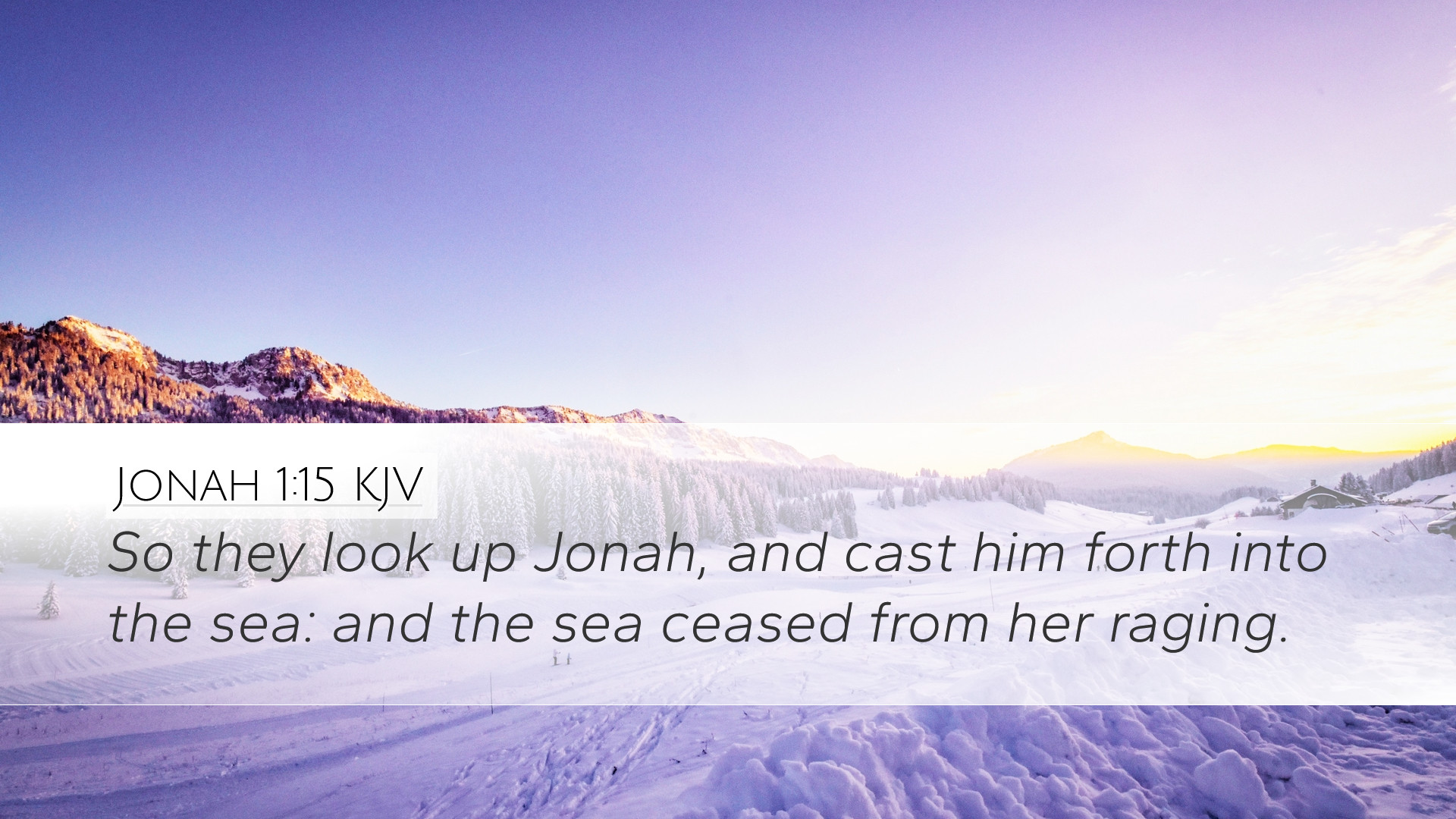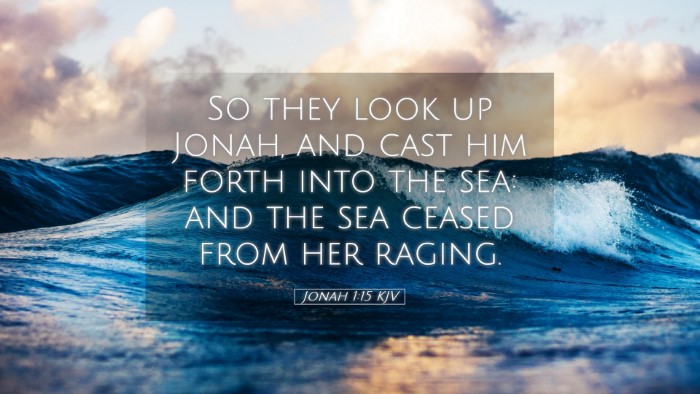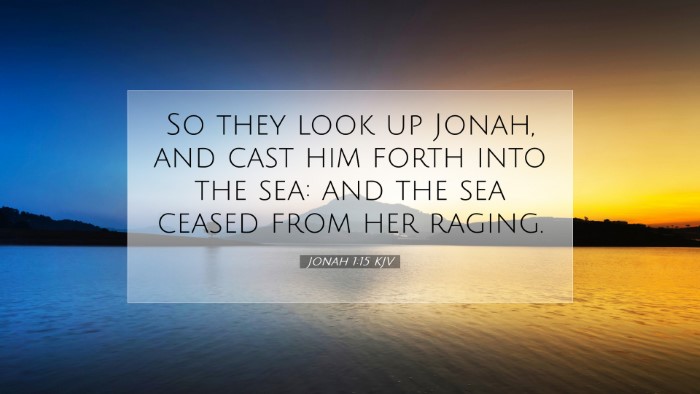Old Testament
Genesis Exodus Leviticus Numbers Deuteronomy Joshua Judges Ruth 1 Samuel 2 Samuel 1 Kings 2 Kings 1 Chronicles 2 Chronicles Ezra Nehemiah Esther Job Psalms Proverbs Ecclesiastes Song of Solomon Isaiah Jeremiah Lamentations Ezekiel Daniel Hosea Joel Amos Obadiah Jonah Micah Nahum Habakkuk Zephaniah Haggai Zechariah MalachiJonah 1:15
Jonah 1:15 KJV
So they look up Jonah, and cast him forth into the sea: and the sea ceased from her raging.
Jonah 1:15 Bible Commentary
Commentary on Jonah 1:15
Verse Context: In Jonah 1:15, we find the pivotal moment when Jonah, after being pursued by a great storm, is cast into the sea by the sailors. This act serves as the climax of Jonah’s disobedience to God’s command to go to Nineveh. The verse reads, “So they took up Jonah, and cast him forth into the sea: and the sea ceased from her raging.”
Insights and Analysis
This verse encapsulates the themes of divine sovereignty, human disobedience, and the merciful character of God. Several reputable public domain commentaries offer valuable insights into its meaning.
Matthew Henry’s Commentary
Matthew Henry observes that the act of casting Jonah into the sea signifies the desperate situation of the sailors, who recognized that Jonah's presence was the cause of their calamity. Henry reflects on the nature of repentance, noting how Jonah’s acknowledgment of his wrongs came too late to prevent the storm but became a catalyst for the sailors’ understanding of God’s power.
He emphasizes the providence of God, stating that the storm was not a mere coincidence but an orchestration of the divine will aimed at correcting Jonah’s course. Henry articulates that while the sailors took action against Jonah, their actions were a reflection of their realization that disobedience to God’s purposes leads to turmoil.
Albert Barnes’ Notes
Albert Barnes elaborates on the act of throwing Jonah into the sea as a symbolic judgment. He points out that the sea, which had been raging, instantly calms as soon as Jonah is cast overboard, illustrating God’s control over nature. Barnes underscores that Jonah, being thrown into the sea, serves not only as a punishment but also signifies a form of deliverance for the sailors who sought to save their own lives.
He also highlights the weight of human responsibility. The sailors initially attempted to row back to land, showing their reluctance to sacrifice Jonah. However, their eventual decision reflects a necessary step that aligns with God’s plan, demonstrating that human intervention often falls short against divine will.
Adam Clarke’s Commentary
Adam Clarke provides an analytical approach, noting that the sailors had previously cast lots to determine who was responsible for the storm, and the lots pointed to Jonah. Clarke comments on the spiritual implications of this act, suggesting that casting lots was a cultural practice that reflects a deeper truth about divine providence guiding human decisions.
He further discusses the sailors' recognition of Jonah as a prophet of the Lord, leading to their fear of God when they understood the consequences of their actions. Clarke emphasizes the mercy of God as evident in the sailors’ lives, contrasted with Jonah's disobedience. The act of throwing Jonah into the sea not only brought peace but also served as a moment of revelation for those who were once ignorant of God’s might.
Theological Reflections
From these insights, we glean profound theological reflections that resonate with pastors, theologians, and students of Scripture:
- Divine Sovereignty: The situation highlights that God’s sovereignty is inviolable. No matter the human rebellion, God’s plan will ultimately prevail.
- Human Agency and Its Consequences: The sailors’ decision to cast Jonah reflects the responsibility believers hold in aligning their choices with God’s directives. Disobedience can lead to disastrous consequences not only for oneself but also for others.
- Repentance and Restoration: Jonah’s story emphasizes that true repentance often requires facing the consequences of our actions. This highlights the transformative journey of returning to God and fulfilling His call, even after moments of failure.
- God’s Mercy: The sailors’ experience shows that God's mercy extends beyond His chosen people; it reaches to those sensitive to the divine will. Their fear of God and subsequent offerings reveal an important biblical truth about divine encounters leading to worship.
Practical Applications
For those in ministry and study, Jonah 1:15 offers practical wisdom:
- Encourage Confession: Leaders should guide congregations toward acknowledging their disobedience and the effects it may have on their spiritual community.
- Promote Dependence on God: Believers must learn to trust in God’s sovereignty and be open to His leading, even when circumstances appear dire.
- Engage in Prayer: Emphasize the importance of prayer in discerning God’s will and supporting those who may be fleeing from their divine purpose.
- Celebrate God’s Mercy: Create opportunities to celebrate God’s merciful interventions in our lives, recognizing that His grace often meets us at our lowest points.
Conclusion
Jonah 1:15 serves as a profound reminder of the complexities of divine calling, human disobedience, and mercy. It challenges readers to reflect on their responses to God’s commands and the inevitable consequences of rebellion. The insights drawn from Matthew Henry, Albert Barnes, and Adam Clarke serve not only to deepen theological understanding but also to inspire practical living in alignment with the divine will.


